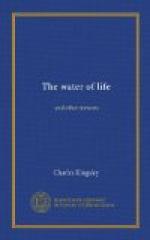These, and other startling utterances, made certain of the early Rabbis doubt the authenticity and inspiration of the Book of Ecclesiastes, as containing things contrary to the Law, and to desire its suppression, till they discovered in it—as we may, if we be wise—a weighty and world-wide meaning.
Be that as it may, it would certainly be a loss to Scripture, and to our knowledge of humanity, if it was proved that this book, in its original shape, was not written by a great king, and most probably by Solomon himself. The book gains by that fact, not only in its reality and truthfulness, but in its value and importance as a lesson of human life. Especially does this text gain; for it has a natural and deep connection with Solomon and his times.
The former days were better than his days: he could not help seeing that they were. He must have feared lest the generation which was springing up should inquire into the reason thereof, in a tone which would breed—which actually did breed—discontent and revolution.
But the fact seemed at first sight patent. The old heroic days of Samuel and David were past. The Jewish race no longer produced such men as Saul and Jonathan, as Joab and Abner. A generation of great men, whose names are immortal, had died out, and a generation of inferior men, of whom hardly one name has come down to us, had succeeded them. The nation had lost its primaeval freedom, and the courage and loyalty which freedom gives. It had become rich, and enervated by luxury and ease. Solomon had civilised the Jewish kingdom, till it had become one of the greatest nations of the East; but it had become also, like the other nations of the East, a vast and gaudy despotism, hollow and rotten to the core; ready to fall to pieces at Solomon’s death, by selfishness, disloyalty, and civil war. Therefore it was that Solomon hated all his labour that he had wrought under the sun; for all was vanity and vexation of spirit.
Such were the facts. And yet it was not wise to look at them too closely; not wise to inquire why the former times were better than those. So it was. Let it alone. Pry not too curiously into the past, or into the future: but do the duty which lies nearest to thee. Fear God and keep His commandments. For that is the whole duty of man.
Thus does Solomon lament over the certain decay of the Jewish Empire. And his words, however sad, are indeed eternal and inspired. For they have proved true, and will prove true to the end, of every despotism of the East, or empire formed on Eastern principles; of the old Persian Empire, of the Roman, of the Byzantine, of those of Hairoun Alraschid and of Aurungzebe, of those Turkish and Chinese-Tartar empires whose dominion is decaying before our very eyes. Of all these the wise man’s words are true. They are vanity and vexation of spirit. That which is crooked cannot be made straight, and that which is wanting cannot be numbered. The thing which has been is that which shall be, and there is no new thing under the sun. Incapacity of progress; the same outward civilization repeating itself again and again; the same intrinsic certainty of decay and death;—these are the marks of all empire, which is not founded on that foundation which is laid, even Jesus Christ.




